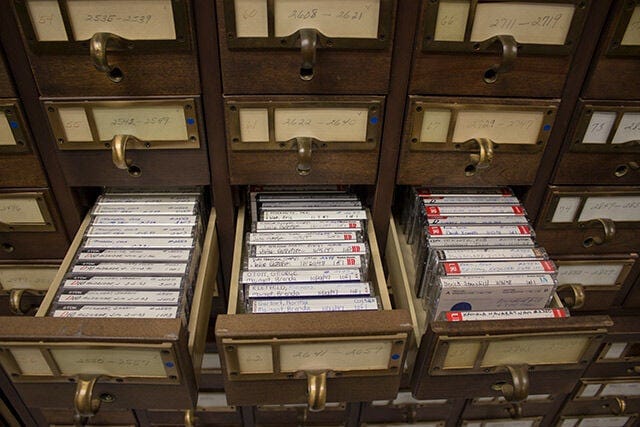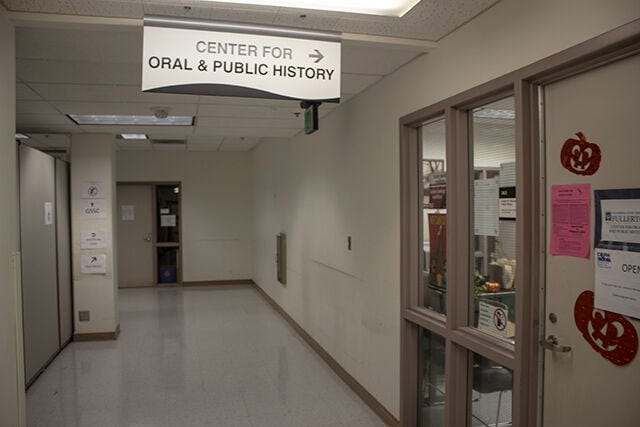Outspoken: A COPH Podcast
From the Center for Oral and Public History at UC Fullerton. This article is from 2015, but the podcast goes on, find it here: https://podcasts.apple.com/us/podcast/outspoken-a-coph-podcast/id11180371
History is brought to life in oral history podcast
By Amy Wells
Oct 17, 2016
Tucked away on the third floor in the south side of the Pollak library are almost 6,000 oral histories waiting to be discovered.
The recordings reside in the Center for Oral and Public History (COPH). To highlight the center’s many collections, Benjamin Cawthra, Ph.D, associate director of the center, and Carie Rael, the office manager, put together a podcast that features new and ongoing projects and collections from students and faculty.
“We think of history as this sort of ‘long ago and far away’ type of thing, but I think oral history makes it very ‘here and now’ and very direct, and that’s what’s exciting about it,” Cawthra said.
“Outspoken: A COPH Podcast” began in May and has aired four episodes so far, which range in subject matter from covering an exhibit on Latino activism to a piece on women in politics.
“Hearing the words of some of these people is just so profound, and you don’t necessarily get that if you read the transcripts,” Rael said. “So it’s a way of getting their voices and stories out there.”
With the help of the COPH’s archivist, Natalie Navar, the team of three creates an hour long episode each month. Because so many of the oral histories in the archive are focused on the rich history of Southern California, much of the podcast is too. However, the podcast aims to highlight some of the pieces that are more related to current events or projects.
Cawthra, who is also an associate professor in the history department, hosts the podcast and co-writes with Rael, who also produces the show. At the start of the podcast, Rael was completely new to editing and has been teaching herself the necessary techniques along the way.
“I feel like I’m learning new skills and being a part of something that I think is really interesting and worth doing,” Rael said.
Rael fell in love with oral history after an emotional interview with Latinas in Orange County, who became activists against police brutality after losing their sons to police violence.
“Every person that I’ve interviewed, I feel a connection to after listening to them speak. The fact that someone felt comfortable enough to share their story makes me feel honored that I was able to share that experience with them,” Rael said.
Most of the center’s recordings were conducted by students for academic projects. The interviews provide an in-depth and personal look into the lives of people throughout some of history’s most memorable moments.
“It kind of brings that human element into it,” Rael said. “You get to just catch a glimpse of their experience by listening to them tell that story, and I don’t think anything really beats that,”
Oral histories bring attention to the voices of everyday people that are often overlooked or ignored.
“There’s no substitute for people telling their stories,” Cawthra said. “We can have a good conversation (on the podcast), but it’s really punctuated and brought to life by the voices of the people in the oral history.”
The archive segment put together by Navar brings each podcast to life. With 300 collections of oral histories, she finds recordings that directly relate to each story.
Navar, who has been at the center for three years, has noticed many students are unaware of the center and hopes the podcast brings attention to resources COPH has available for faculty and students.
“I hope it is going to reach out to more students and reach out to more faculty members who would want to use oral history,” Navar said. “Part of our mission is to collect these oral histories, but it’s also to get these public histories out to the public.”
To those who might not find reading history interesting, Navar thinks that oral histories make topics more fun to learn about because they can provide a different and more human perspective.
Navar works on several projects at a time to keep the center running and updated. With a team of student assistants and volunteers, Navar is currently working on digitizing the center’s oral histories, many of which are still in their original format on reel-to-reels and cassettes.
Cawthra, Rael and Navar would love to see a growth in the podcast’s audience and a growth of interest in the center.
“I think it’s maybe a growing trend in the oral history community, so I’m excited and looking forward to it hopefully getting bigger and catching on more,” Rael said.
The podcast is available on the COPH website, as well as on iTunes and SoundCloud.
“What we hope is that more and more people are able to click on us and listen and make it a part of their lives,” Cawthra said.





